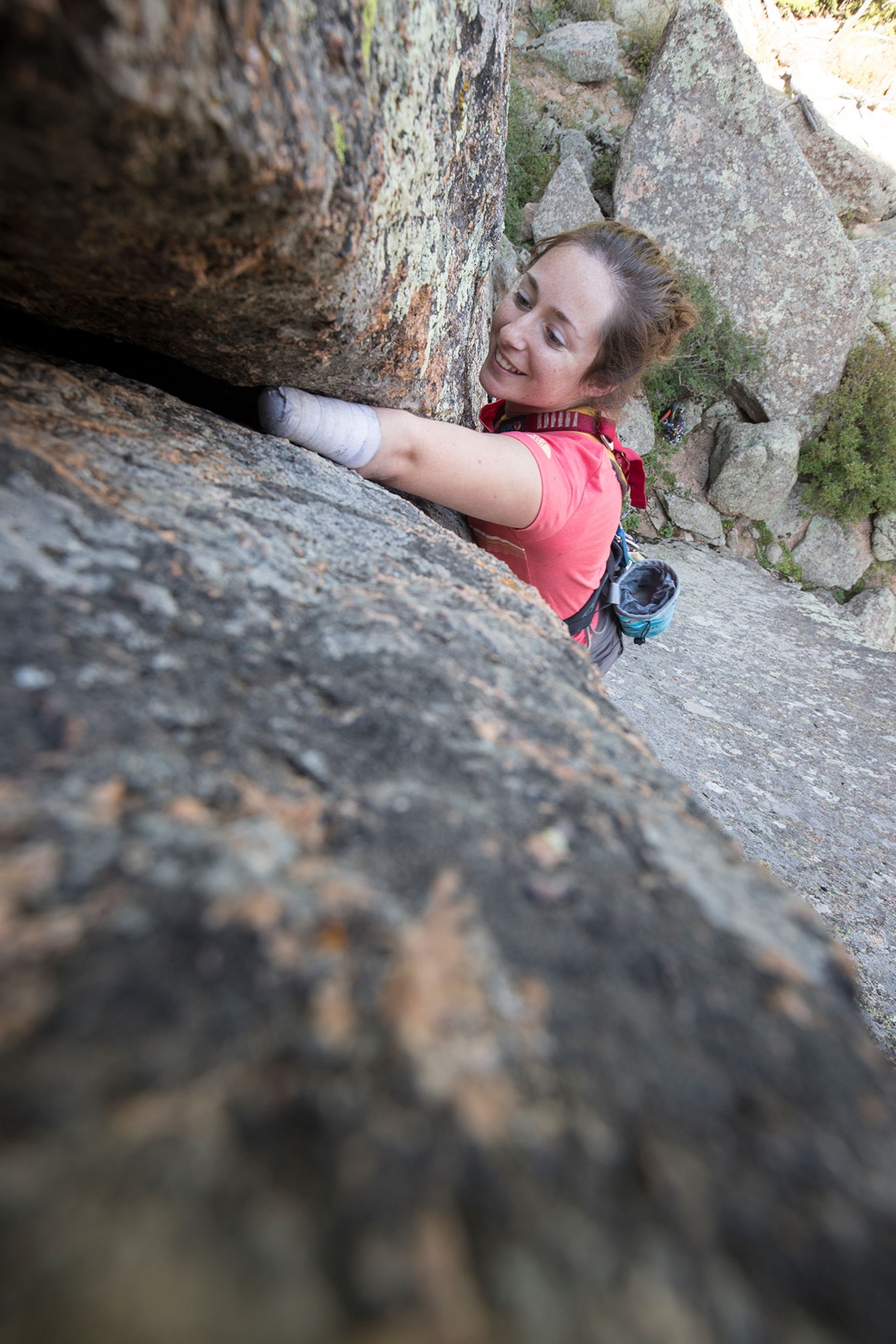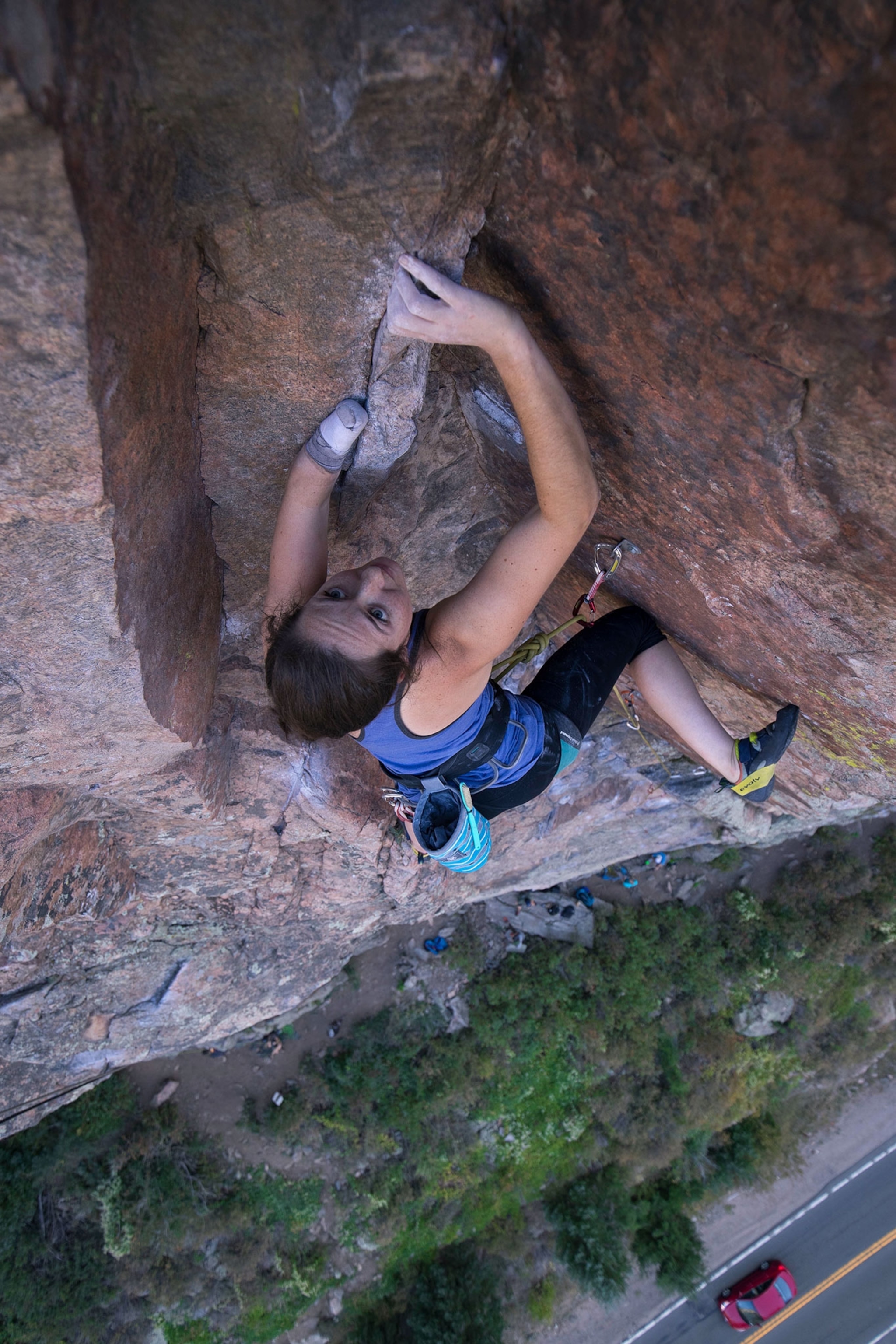How a one-handed champion is reinventing rock climbing
Born without her lower left arm, National Geographic Adventurer of the Year Maureen Beck is pushing the sport to new heights.
In 2009, Maureen “Mo” Beck took up ice climbing after graduating college in Vermont. She made a post on rockclimbing.com, a then-popular resource for everything climbing-related, that read something to the effect of, “Hey guys, I’m missing my left arm below the elbow, so I chopped off the end of a Trango ice tool, put a screw in it, and attached it to the socket of my prosthetic. Wondering if this would be okay to climb with?”

One response stood out. It came from Trango’s founder, Malcolm Daly, who also climbs with only three limbs (he’s missing his lower right leg). Daly wrote Beck that it would be okay so long as she didn’t sue Trango if something went wrong and invited her to attend the second-annual Gimps on Ice in Ouray, Colorado. The ice-climbing event was the brainchild of Paradox Sports, a fledgling organization in Boulder, Colorado, that aims to enable rock climbing, ice climbing, and mountaineering for people with disabilities.
Up to that point, Beck, who was born without a left hand and forearm, hadn't embarked on any outdoor activities with other disabled people. She grew up in an outdoorsy family with three younger brothers, in a small town just outside of Acadia National Park. Her parents didn’t treat her any differently than her siblings, and Beck learned to devise workarounds for her missing hand, such as duct-taping the paddle to her prosthetic so she could go canoeing. In school, Beck insisted on trying every sport presented in her gym class. Even if that meant she had to use her single hand both to throw and to catch the baseball—barehanded. At soccer tryouts for middle school, Beck wanted to be the goalie. Her typical reaction when a coach, camp counselor, or gym teacher told her she “might want to sit this one out,” was to dig in: "You think I can’t do it? Watch me."
“My parents once tried to put me in a summer camp for kids with disabilities, and I hated it,” Beck says. “I didn’t relate to anybody. I felt like it was just a lot of time wasted feeling bad for yourself.”

When Beck arrived in Colorado for Gimps on Ice, she found an entirely different situation. There, a dozen people missing limbs or eyes or the use of their legs worked to scale the 100-foot, iced-over walls of the Uncompahgre Gorge. And they made no excuses. “They were actual athletes,” says Beck. “They were climbing their asses off, and at night, they were drinking their faces off. It was a rager all weekend. And I thought okay, these might be my people.”
Beck was witnessing the start of a recalibration in climbing: the idea that the sport could be mastered, and even taken to new levels, by disabled people, much like paracycling and paraskiing. For the first time in her life, Beck craved connection with other disabled folks. She became a regular at Gimps on Ice. Then in 2012, upon moving to Boulder, Colorado, she contacted Paradox Sports and injected herself into the local disabled climbing community. From that moment forward, Beck climbed regularly with her fellow adaptive athletes.

It was an exciting time. In April 2013, Ronnie Dickson, a paraclimber from Florida rallied the Paradox climbing community to attend the annual GoPro Mountain Games, held in Vail, Colorado, and to compete in the games’ first-ever adaptive climbing category. Beck competed, more out of solidarity than genuine interest, coupled with a desire to hang out in a condo in Vail with a bunch of her disabled climber friends. But once there, Beck started to feel a rekindling of the fire of her youth. “I didn’t medal,” she says. “And that kind of pissed me off.”
The next year, in Atlanta, the U.S. held its first-ever adaptive climbing national championships. Beck was the only participant in her category (Female Upper Limb) and won merely by showing up and climbing. It wasn’t ideal, but Beck felt buoyed by the fact that the medal qualified her to go to Spain to compete in the World Championships. In Madrid, her first trip outside of the U.S., Beck became the first American woman to win a International Federation of Sport Climbing (IFSC) Paraclimbing World Championship. Perhaps more importantly, she met other women with just one arm who climbed as hard as she did.

Beck has since amassed six national titles, in both roped and bouldering formats, and successfully defended her World Champion title in France, in 2016 (IFSC Paraclimbing World Championships are every two years). At the 2018 World Championships, in Austria, Beck finished third. “It was actually a super awesome way to lose,” she says. “There were more women in my category than ever before, and they were stronger than ever before.”
The 2020 IFSC Paraclimbing World Championships have been bumped up to 2019, as not to overlap with the Olympics. Beck says it will be her last competition, so she can focus on other ambitions. First up: “Exploding” disabled people’s participation in the sport. Beck recently took over as chair of the paraclimbing committee for USA Climbing, the governing body of competitive climbing in the United States. On March 30, 2019, she expects more than a hundred athletes to attend U.S. Nationals in Columbus, Ohio. Long gone are the days when Beck was the only participant in her category. But she believes there’s still much work to be done in educating adaptive climbers on how to grow and excel and in providing the tools and resources for them to do so.

To that effect, she’s also working as an instructor for Paradox Sports to conduct workshops across the nation on how climbing gyms can best accommodate disabled athletes. “So that when someone with a disability shows up at their local climbing gym, the person behind the desk doesn’t look at them like they’re crazy,” Beck says. “I call it normalizing the abnormal—just make it so common that it’s just not a big deal anymore.” She’s done six such workshops in the past year, and says that demand is high—Paradox has conducted about a hundred so far in total.
And of course, Beck wants to continue to push the boundary of what’s perceived as possible for adaptive athletes climbing in the outdoors. So far, the most difficult route she's climbed is rated 5.12a according to the Yosemite Decimal System, a difficulty rating that’s inaccessible for most people, disabled or not. Beck was the first woman missing an upper limb to climb that grade, and her quest was documented in the award-winning documentary, Stumped. Currently, Beck has her eye on a 5.12c, a route named Archangel that follows an inward facing corner that stretches a hundred feet up a canyon wall just outside of Boulder. “Alex Honnold actually recommended it to me.” says Beck, “He said 'Well, there aren't really hands anyway, so it's not like you're at that much of a disadvantage.’”
Not just satisfied with rock climbing, Beck completed her first mountaineering expedition last August. Along with adaptive climber Jim Ewing, she climbed the Lotus Flower Tower, an 8,470-foot granite peak in the Cirque of the Unclimbables in Canada’s Northwest Territories. She intends to visit Yosemite National Park for the first time in fall 2019 to test her mettle on America’s biggest walls, which soar to 3,000 feet. “I don’t know what the real limit is,” she says, speaking of what’s possible for disabled climbers. “I don’t think we’ve found it yet.”
You May Also Like
Go Further
Animals
- This ‘saber-toothed’ salmon wasn’t quite what we thoughtThis ‘saber-toothed’ salmon wasn’t quite what we thought
- Why this rhino-zebra friendship makes perfect senseWhy this rhino-zebra friendship makes perfect sense
- When did bioluminescence evolve? It’s older than we thought.When did bioluminescence evolve? It’s older than we thought.
- Soy, skim … spider. Are any of these technically milk?Soy, skim … spider. Are any of these technically milk?
- This pristine piece of the Amazon shows nature’s resilienceThis pristine piece of the Amazon shows nature’s resilience
Environment
- This pristine piece of the Amazon shows nature’s resilienceThis pristine piece of the Amazon shows nature’s resilience
- Listen to 30 years of climate change transformed into haunting musicListen to 30 years of climate change transformed into haunting music
- This ancient society tried to stop El Niño—with child sacrificeThis ancient society tried to stop El Niño—with child sacrifice
- U.S. plans to clean its drinking water. What does that mean?U.S. plans to clean its drinking water. What does that mean?
History & Culture
- Séances at the White House? Why these first ladies turned to the occultSéances at the White House? Why these first ladies turned to the occult
- Gambling is everywhere now. When is that a problem?Gambling is everywhere now. When is that a problem?
- Beauty is pain—at least it was in 17th-century SpainBeauty is pain—at least it was in 17th-century Spain
- The real spies who inspired ‘The Ministry of Ungentlemanly Warfare’The real spies who inspired ‘The Ministry of Ungentlemanly Warfare’
- Heard of Zoroastrianism? The religion still has fervent followersHeard of Zoroastrianism? The religion still has fervent followers
Science
- Here's how astronomers found one of the rarest phenomenons in spaceHere's how astronomers found one of the rarest phenomenons in space
- Not an extrovert or introvert? There’s a word for that.Not an extrovert or introvert? There’s a word for that.
- NASA has a plan to clean up space junk—but is going green enough?NASA has a plan to clean up space junk—but is going green enough?
- Soy, skim … spider. Are any of these technically milk?Soy, skim … spider. Are any of these technically milk?
- Can aspirin help protect against colorectal cancers?Can aspirin help protect against colorectal cancers?
Travel
- What it's like to hike the Camino del Mayab in MexicoWhat it's like to hike the Camino del Mayab in Mexico
- Follow in the footsteps of Robin Hood in Sherwood ForestFollow in the footsteps of Robin Hood in Sherwood Forest
- This chef is taking Indian cuisine in a bold new directionThis chef is taking Indian cuisine in a bold new direction
- On the path of Latin America's greatest wildlife migrationOn the path of Latin America's greatest wildlife migration
- Everything you need to know about Everglades National ParkEverything you need to know about Everglades National Park






